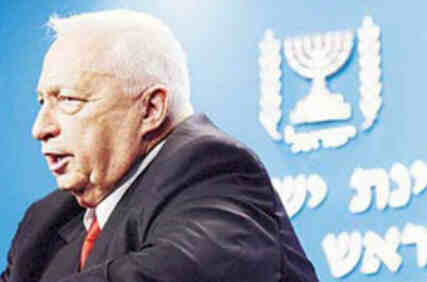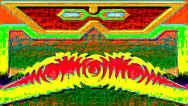 ^
On
a 05 November:
^
On
a 05 November: 2002 Israeli Prime Minister, criminal Ariel Sharon [27 Feb 1928 – 2007] [photo >] announces early general elections. They will be held on 28 January 2003.
2002 Non-presidential elections in the US. Contrary to the usual losses, in such elections, by the party of the President, the Republicans eke slight gains in general. These are most significant in the US Senate, which, when the new Congress convenes on 03 January 2003, will have 52 Republicans, 45 Democrats, and 1 Independent (previously 49 R, 50 D, 1 I). The slim Republican majority in the US House of Representatives will become slightly less slim: 230 R, 204 D, 1 I (from 223 R, 210 D, 2 I). Only in the number of state Governors do the Democrats improve their numbers: 26 R, 24 D (from 27 R, 21 D, 2 I).
2002 Voters in Oregon vote to remove from their state constitution (adopted in 1857) passages such as: “No free negro, or mulatto, not residing in this state at the time of the adoption of this constitution, shall come, reside, or be within this State, or hold any real estate.” This provision has not been enforced recently, but only some 56'000 Blacks live in Oregon, less than 2% of the population.
2002 MISSOURI WANTS TO SEE TALENT IN THE US SENATE. A majority of Missouri voters choose Jim Talent (Republican), over Jean Carnahan (Democrat) for US Senator. Talent was a US Representative from 1992 to 1998 and an unsuccessful candidate for governor in 2000. Carnahan's husband, Governor Mel Carnahan, died in a plane crash on 16 October 2000, three weeks before Election Day (07 November 2000). He still was elected to the Senate, unseating current Attorney General John Ashcroft (a vicious violator of human and civil rights), and Mrs. Carnahan was appointed to the seat for the first 2 years of the 6-year term. The remaining 4 years will be served by Talent.
2002 Under relentless pressure, Harvey Pitt resigns as chairman of the US Securities and Exchange Commission.
| ^
2000 Japanese archeologist apologizes for faking sensational
find. Early in the morning of 27 October 2000, prominent Japanese archeologist Shinichi Fujimura secretly planted eight stoneware pieces at an excavation site, where it is believed humans lived 600'000 years ago. Later in the day he simulated discovering Japan's oldest stoneware and announced it, to the admiration of his colleagues. However a newspaper discovered the fraud and, on 05 November 2000, on TV, Fujimura admits that he has fabricated the findings at the Kamitakamori ruins in Miyagi Prefecture and the Soshin-Fudozaka site in Hokkaido. Fujimura says that he has collected some of the stone tools purported to have been found in Kamitakamori at a nearby site and collected others in Mount Yakurai in northern Miyagi for the Hokkaido ruin. Fujimura admits to staging the discovery of 61 of the 65 tool fragments at Kamitakamori and 29 in Hokkaido in an excavation conducted in September and October 2000. In a brief press interview on 18 December 20001 Fukimora would deny rumors that more dig finds he was involved in were also fakes. |
1999 Chechens flee despite Russian assurances of safety (CNN)
1999 Andy Hiller, the political correspondent for WHDH-TV in Boston, asks presidential candidate George W. Bush if he could name the president of Chechnya (Aslan Maskhadov), the general who recently took power in Pakistan (General Pervez Musharraf in a 12 October coup), the new prime minister of India (Atal Behari Vajpayee since 19 March 1998), the president of Taiwan (Lee Teng-hui since 13 Jan 1988, who would be followed by Chen Shui-bian on 20 May 2000). Bush can answer only that this last one is "Lee."

